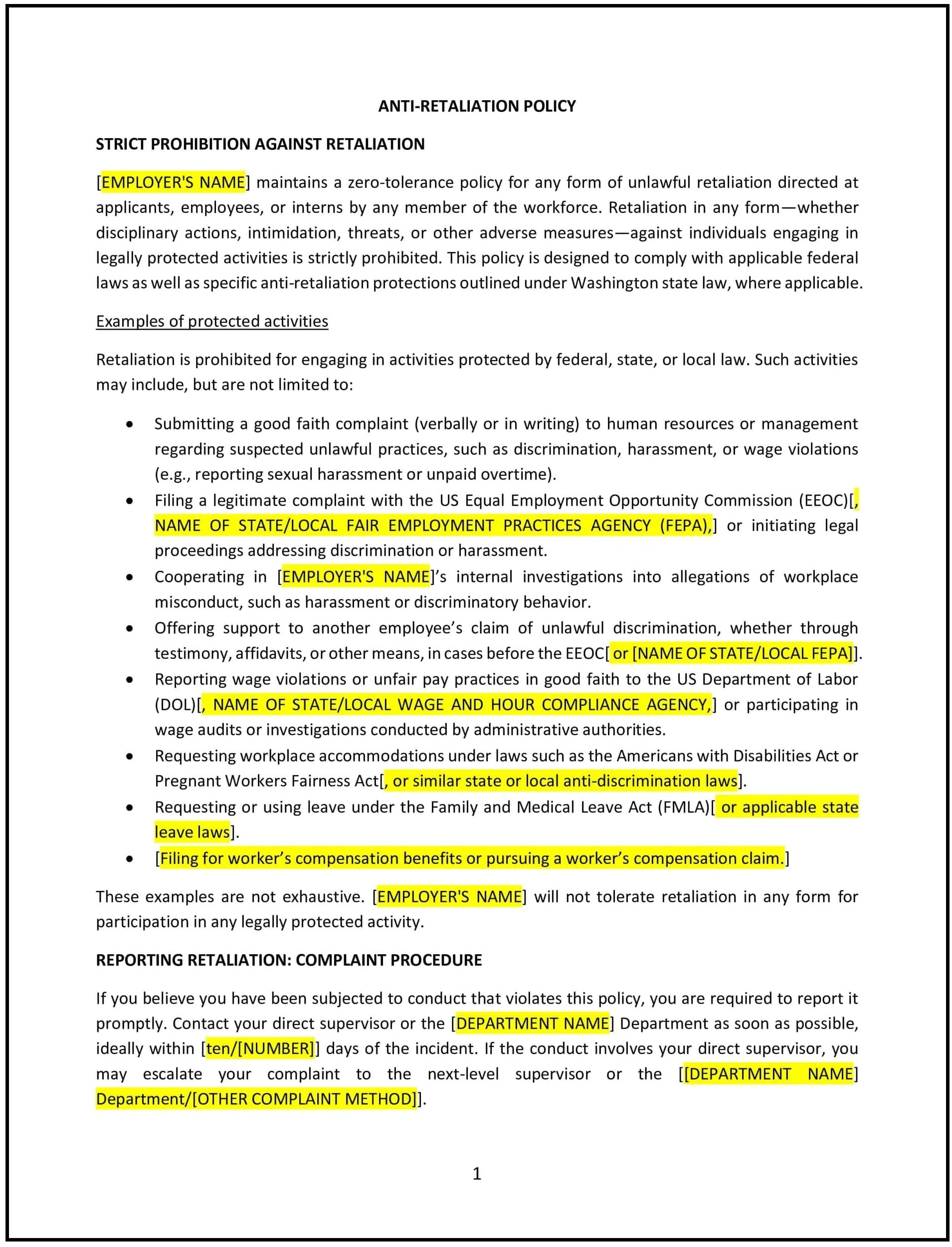Anti-retaliation policy (Washington): Free template
Got contracts to review? While you're here for policies, let Cobrief make contract review effortless—start your free review now.

Customize this template for free
This anti-retaliation policy is designed to help Washington businesses create a work environment where employees can report concerns, make complaints, or participate in investigations without fear of retaliation. The policy outlines the company’s commitment to protecting employees from retaliation for engaging in protected activities, such as reporting harassment, discrimination, or illegal conduct. It establishes clear procedures for reporting retaliation and the actions that will be taken to address any retaliation incidents.
By adopting this policy, businesses can foster a culture of transparency, fairness, and accountability, while also enhancing compliance with Washington state and federal laws.
How to use this anti-retaliation policy (Washington)
- Define retaliation: Clearly define what constitutes retaliation under the policy. Retaliation includes any adverse action taken against an employee because they engaged in a protected activity, such as filing a complaint, participating in an investigation, or reporting wrongdoing. Examples of retaliation may include demotion, pay cuts, job reassignment, or unfair disciplinary action.
- Outline protected activities: List the specific activities that are protected under the policy, such as reporting workplace discrimination or harassment, participating in an investigation, or whistleblowing about illegal or unethical practices. The policy should ensure that employees are aware of their rights to engage in these activities without fear of retaliation.
- Establish a reporting process: Create a clear and accessible reporting process for employees to report retaliation. The policy should specify the channels through which employees can report concerns, such as HR, a designated manager, or a confidential reporting system. Employees should be encouraged to report retaliation incidents promptly.
- Investigate complaints promptly: The policy should outline the process for investigating allegations of retaliation. This includes ensuring that investigations are thorough, impartial, and conducted in a timely manner. Employees should be informed of the process and given updates when appropriate.
- Define consequences for retaliation: Clearly state the consequences for employees who engage in retaliation. The policy should specify the disciplinary actions that will be taken against those found guilty of retaliating against others, which could include warnings, suspension, or termination, depending on the severity of the offense.
- Ensure compliance with Washington and federal laws: The policy should comply with Washington state laws, including the Washington Law Against Discrimination (WLAD), and federal regulations such as Title VII of the Civil Rights Act of 1964, which protect employees from retaliation.
- Review and update regularly: Periodically review and update the policy to ensure it remains compliant with Washington state laws, federal regulations, and any changes in the company’s operations or workplace culture.
Benefits of using this anti-retaliation policy (Washington)
This policy offers several benefits for Washington businesses:
- Promotes a safe reporting environment: By protecting employees from retaliation, businesses encourage reporting of unethical or illegal activities, which can help identify and address issues before they escalate.
- Increases employee trust: When employees know that their rights are protected and that they will not face retaliation for speaking up, they are more likely to trust the company and feel supported in raising concerns.
- Reduces legal risks: The policy helps businesses comply with Washington state and federal anti-retaliation laws, reducing the risk of legal action or claims related to retaliation.
- Improves workplace culture: A culture of transparency and accountability fosters positive employee relations, reduces workplace tension, and creates a more supportive and collaborative work environment.
- Enhances employee morale: Employees who feel safe from retaliation are more likely to be engaged and productive, contributing to a positive workplace atmosphere.
- Protects the company’s reputation: Businesses that demonstrate a strong commitment to anti-retaliation practices enhance their reputation as fair and ethical employers, which can attract top talent and improve relationships with stakeholders.
Tips for using this anti-retaliation policy (Washington)
- Communicate the policy clearly: Ensure that all employees are aware of the anti-retaliation policy and understand how to report concerns about retaliation. Include the policy in the employee handbook and review it during onboarding or at regular team meetings.
- Provide training on retaliation prevention: Conduct regular training for employees and management on identifying and preventing retaliation. The training should cover the types of protected activities, what constitutes retaliation, and how to handle retaliation claims.
- Create a safe reporting environment: Encourage employees to report retaliation concerns without fear of retaliation. Ensure that reporting channels are confidential, accessible, and trusted by employees.
- Investigate complaints promptly: Take swift action to investigate any reports of retaliation. The policy should specify the timeline for investigating complaints and how employees will be kept informed during the process.
- Enforce the policy consistently: Ensure that all retaliation claims are addressed fairly and consistently. Employees who engage in retaliation should be held accountable according to the policy, and corrective actions should be taken when necessary.
- Review and update regularly: Periodically review the policy to ensure it remains compliant with Washington state laws, federal regulations, and any changes in the company’s operations. Regular reviews will help ensure the policy stays effective and up to date.